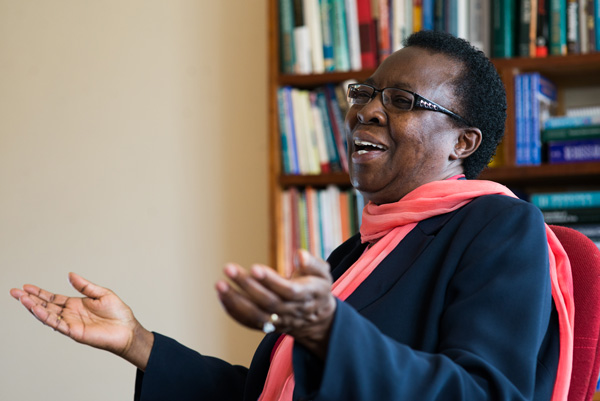Care for the Hurting with Gladys Mwiti

Langham supports the PhD studies of future theological leaders—godly men and women who go on to shape their nations for Christ. Langham Scholar Gladys Mwiti, pictured here, is one of these leaders. She is an internationally recognized expert in trauma and biblical counseling.
Together with you, Langham trains and resources leaders to extend the gospel within their communities, meeting spiritual and social needs. They launch salt and light ministries, start and teach in seminaries, plant churches, and become powerful voices within their cultures. Kenya’s Gladys Mwiti is one of these leaders.
After receiving her PhD with support from Langham, she returned to Nairobi to launch Oasis Africa Counseling Center in response to the suffering she observed in her community. Today she is a global authority on trauma counseling—work that has put her on the frontlines of tragedies like the Rwandan genocide and Nairobi’s Westgate mall attacks. Gladys is teaching the church to not only proclaim that God is good all the time—but to live it out by drawing near to the broken and the suffering.
Click below to listen to Chris Wright, Langham’s International Ministries Director, and Gladys talk candidly about the resiliency of the African church, the ministry of biblical counseling, and what we can learn from our African sisters and brothers in Christ.
Some Highlights from their Conversation
On why she left the classroom as a chemistry teacher to study biblical counseling:
I taught in two day high schools (in Nairobi). Now these day high schools actually take kids from the suburbs, from the Nairobi suburbs, which are low economic status, lots of crime, violence. … Wherever you go as a Christian you are a missionary and for me, I’ve always been a missionary bringing kids to the Lord. And so there was a big mighty revival in my last high school, and one of the girls that came to the Lord was a 14 year old, who I knew along the way as I counseled her and discipled her, that she was living in a very troubled home, violent father and all the troubles that go with domestic violence. . . I knew how to put solutions together in chemistry and how to balance pendulums, but I didn’t know what to do with broken girls. So I did the best I could to comfort her. And once again, like I usually would do, I came home to my husband and I said, “I don’t know what to do.” It had become a common story, anytime I came home to tell him about broken kids. And so he told me, “Why don’t you go back to school and get some tools to help these children?”

On biblical counseling as missional work:
I’m smiling because it’s John Stott who got me to [study for a PhD in biblical counseling]. . . . He is the one who told me apply to Fuller, because I told him I want to go somewhere where I can do psychology and also be able to do theology for integration. He said, “Apply to Fuller and I promise you at least a scholarship for the first few semesters while you settled down.”
So I went on a head to Fuller got my PhD. And so what does this have to do with missions? I’ve always been a missionary . . . For me, my theme in life is to know Christ and make him known, and so I use my therapy room as a missionary ground. While we are ministering to all the needy . . . Jesus Christ went around preaching, teaching and healing and he healed even mental illness, not just mental health struggles. So Christ was so holistic in his ministry.
On the harm done by prosperity gospel and churches ill-equipped to help people biblically respond to trauma:
Let me give you an example, I preach a lot in churches and I was in a huge church doing a ladies conference, I think two years ago, with 3,000 women present. Now this mega church is founded in almost a slum area, and so it was packed with women from this community. . . .I addressed the needs of women that I was asked to address. And then the Bishop took over from me now to talk about praying and how God should break through for them. And then [he] started praying for people, “Come I pray for you.” And the hundreds of crying women were lying on the stairs that led to the pulpit on their faces weeping and crying. Others were bringing bundles of money, placing them on the alter because they have been told, if you put money here, you receive a blessing from the Bishop.
I wept that day. And of course, after the prayer, all of them got up and went away. Question: what issues were they bringing? Who wanted to know? And even if they listened, who had the capacity to understand what solutions were there? So when a woman like that goes home and nothing in her home has changed, guess who doesn’t have the faith? It’s her.
Take the next step with Langham
Learn more about how Langham trains strategic leaders like Gladys around the world.
Explore more conversations on our new podcast, On Mission with Chris Wright.
